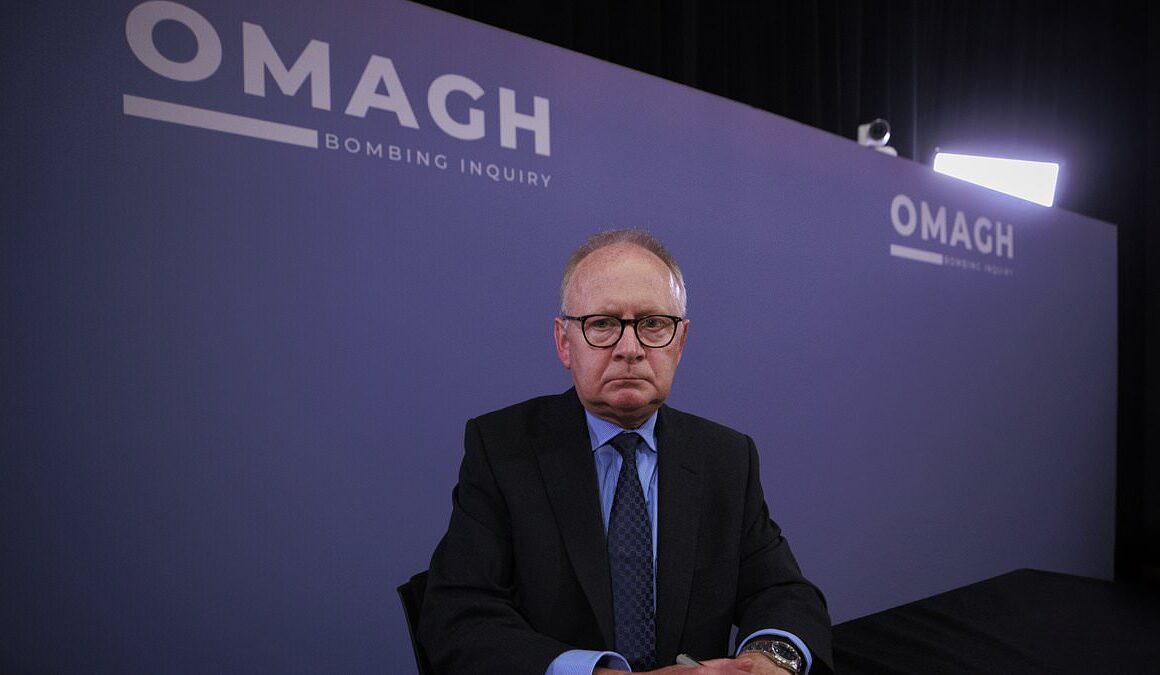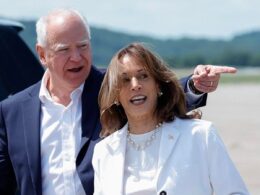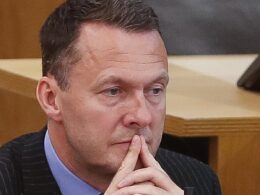Families bereaved in the Omagh bombing have expressed hope that they will finally receive answers as the long called for public inquiry into the atrocity finally opened.
The probe, led by chairman Lord Turnbull, is examining whether the 1998 bombing could reasonably have been prevented by UK authorities.
The bombing was the biggest atrocity of the Troubles, killing 29 people including a woman pregnant with twins, in the town of in Omagh, Northern Ireland.
The dissident republican bomb – planted in a maroon Vauxhall Astra on August 15, 1998 – also injured hundreds of others when it devastated the Co Tyrone town.
Some of the bereaved families, who have called for decades for a public inquiry into alleged security failings, welcomed the inquiry opening yesterday.
As the inquiry began on Tuesday, its chair, Scottish judge Lord Turnbull, vowed it will undertake its work ‘rigorously and fearlessly’.

Chair of the Omagh Bombing Inquiry Lord Turnbull at the Strule Arts Centre in Omagh

Omagh bomb campaigners Michael Gallagher (left) who lost his son Aiden and Stanley McCombe (right) who lost his wife Ann

Security experts examine the charred remains of the vehicle thought to have contained the bomb which exploded in Omagh’s shopping area in Northern Ireland, August 16, 1998
And as families and survivors gathered at the Strule Arts Centre for the first public hearing, the names of all those killed were read out while those in the hearing room stood for a minute’s silence.
In his opening statement, Lord Turnbull said the attack, which came just months after the signing of the Belfast/Good Friday Agreement, caused ‘outrage and consternation across national boundaries and across continents’.
He added that the pain of bereavement and trauma caused by the dissident republican bomb attack spread beyond Omagh and Northern Ireland to families from England and Spain.
The probe is expected to scrutinise the sharing of intelligence information, the use of mobile phone analysis, whether there was advance knowledge of the bomb and whether disruption operations could have been utilised to stop it.
But it is not its purpose to identify the individuals responsible.
Three days after the attack, the Real IRA claimed responsibility. The dissident republican group said its targets were ‘commercial’ and apologised to ‘civilian’ victims.
No one has ever been convicted for the bombing, however, Real IRA leader Michael McKevitt was found responsible in a 2009 civil case. Liam Campbell, Colm Murphy and Seamus Daly were also found liable for the attack.
It has been contended that the terrorists prepared the bomb in the Republic of Ireland and fled back across the border after planting it in Omagh on August 15 1998.
The Irish government has promised to assist the inquiry, but it has rebuffed a call for a separate or joint public inquiry.
The inquiry said, however, it is seeking ‘clear written agreements’ with the Irish government over co-operation, including access to materials held in the Republic of Ireland and Irish witnesses.

A police officer looking at the damage caused by a bomb explosion in Market Street, Omagh

Claire Hayes, sister of Alan Radford who was killed in the Omagh bomb, with her husband Jony Hayes at the Strule Arts Centre in Omagh

Former Northern Ireland Secretary Chris Heaton-Harris established the probe to investigate whether the attack could have been avoided

Omagh bomb campaigner Michael Gallagher speaks to the media at the Silver Birch Hotel in Omagh, Co Tyrone, after then Northern Ireland Secretary Chris Heaton-Harris said he intended to establish an independent statutory inquiry into the 1998 bombing
The inquiry into the atrocity was ordered last year by former secretary of state Chris Heaton-Harris following a legal challenge by a bereaved family.
Michael Gallagher, whose son Aiden died in the Real IRA attack, brought the legal challenge that resulted in a judge directing the state to act.
High Court judge Mr Justice Horner, in a judgment, directly recommended that the UK Government carry out an investigation into alleged security failings in the lead-up to the atrocity.
While having no jurisdiction to order the Irish government to act on the matter, the judge urged authorities there to establish their own probe in light of his findings.
Earlier this month, the Irish government formally agreed to provide assistance to the inquiry.
Mr Gallagher welcomed the start of the inquiry yesterday and said the hearing will be the first time since 1998 that all of the bereaved families, including those caught up in the blast from Spain, will come together.
Speaking as he arrived at the Strule Arts Centre on Tuesday morning, Mr Gallagher said it had taken a long time to get here.
‘It has taken us 26 years to get here and we’re just delighted,’ he said.
‘One of the sad ironies is that when I got up this morning and saw the sunshine, it was exactly the same on August 15, 1998. It was one of the most beautiful days of that year.
‘It’s good to be here. It’s a long time but we are where we want to be and we just have to wait and see where this inquiry takes us.
‘Every morning I waken up and still pinch myself, I can’t believe that we’re there.’
Stanley McCombe, who lost his wife Ann in the bombing, said he had great faith in Lord Turnbull and his legal team. ‘After years of hard labour we’re hopeful, we’re very very hopeful,’ he added.

Lord Turnbull vowed the inquiry will undertake its work ‘rigorously and fearlessly’

Strule Arts Centre in Omagh where chairman of the inquiry Lord Turnbull convened the first public hearing into the Omagh bomb attack

Chair of the Omagh Bombing Inquiry Lord Turnbull at the Strule Arts Centre in Omagh, ahead of the first public hearing

Paul Greaney KC, Counsel to the Omagh Bombing Inquiry, arriving at the Strule Arts Centre in Omagh

Ruairi de Burca (centre), a senior official with the Government of Ireland Department of Foreign Affairs, arriving at the Strule Arts Centre in Omagh
Survivors have also gathered in Omagh for the hearing which included opening remarks from the chair and counsel to the chair Paul Greaney KC.
Commemorative and personal statements are set to be made during inquiry hearings next January.
The Daily Mail has long campaigned on behalf of the families for both transparency and justice.
Two years after the attack, relatives announced in the Mail their intention to launch a landmark legal action for damages and readers helped raise £1.2million – with the Government subsequently providing the extra £800,000 needed to bring a civil case.
The nine-year crusade – spearheaded by the Mail – resulted in a historic court victory in 2009 as families were awarded more than £1.6million in damages against four Real IRA terrorists over the bombing.
As the inquiry opened, chair Lord Turnbull said it will undertake its task rigorously and fearlessly, and emphasised the ‘defining character of the inquiry must be its independence’.
He said: ‘The value which the inquiry attaches to its independence means that it will not be amenable to influence from any government or from any state agency.
‘It will not allow itself to be deflected from its purpose by the difficulties which may lie in its way on account of the passage of time or the volume and complexity of materials.
Lord Turnbull also told the hearing that he will approach the task with an open mind, and ‘will assess the evidence which is heard both fairly and reasonably’.
He added: ‘I will do so without any preformed view or impression as to whether the atrocity could or could not have been prevented.’
In his opening statement, Paul Greaney KC, counsel to inquiry chairman Lord Turnbull, said it is ‘highly likely, if not inevitable, that the state authorities within the Republic of Ireland hold evidence and bearing upon the inquiry’s terms of reference’.
He added that access to materials and citizens requires co-operation from the Irish government.
He said inquiry staff have held a number of meetings with Irish government officials and the Irish police, and commended ‘positive discussions’.
He said: ‘The discussions that have taken place have been positive, and during them, the government of Ireland has expressed a strong desire to co-operate fully with the inquiry.
‘The challenge is to see the engagement that has occurred to date translated to meaningful engagement with the inquiry’s processes, both leading up to and during the course of inquiries or evidence hearings.
‘We emphasise that the inquiry team does not doubt that the government of Ireland has a strong commitment to achieving that vital aim.’
He added: ‘The intention of the inquiry is to ensure that those discussions now move into a practical phase in which clear written agreements are put in place, to make certain that the inquiry has full access to any potentially relevant materials held by the state authorities in the Republic of Ireland, and that it has the ability to obtain statements and call witnesses to attend the inquiry, to give evidence in person.’
Two senior officials from Ireland’s Department of Foreign Affairs attended the inquiry hearing on Tuesday.
The Irish government told the inquiry that it will do everything in its power to help.
A statement was read out during proceedings by one of its Department of Foreign Affairs officials, Ruairi de Burca, who said assistance ‘will be grounded in law to support concrete action’.
Mr de Burca added: ‘The government is committed to put in place additional new legislation, if that is what is required, to support our assistance to the Inquiry.
‘These important details are being worked through with the inquiry team, to ensure that our engagement proceeds on the strongest possible footing.
‘Our commitment is to ensure that there is nothing left unanswered in our jurisdiction at the end of the inquiry.’
Dublin has previously faced criticism for rejecting calls from some victims’ families to establish its own public inquiry into the bombing.







